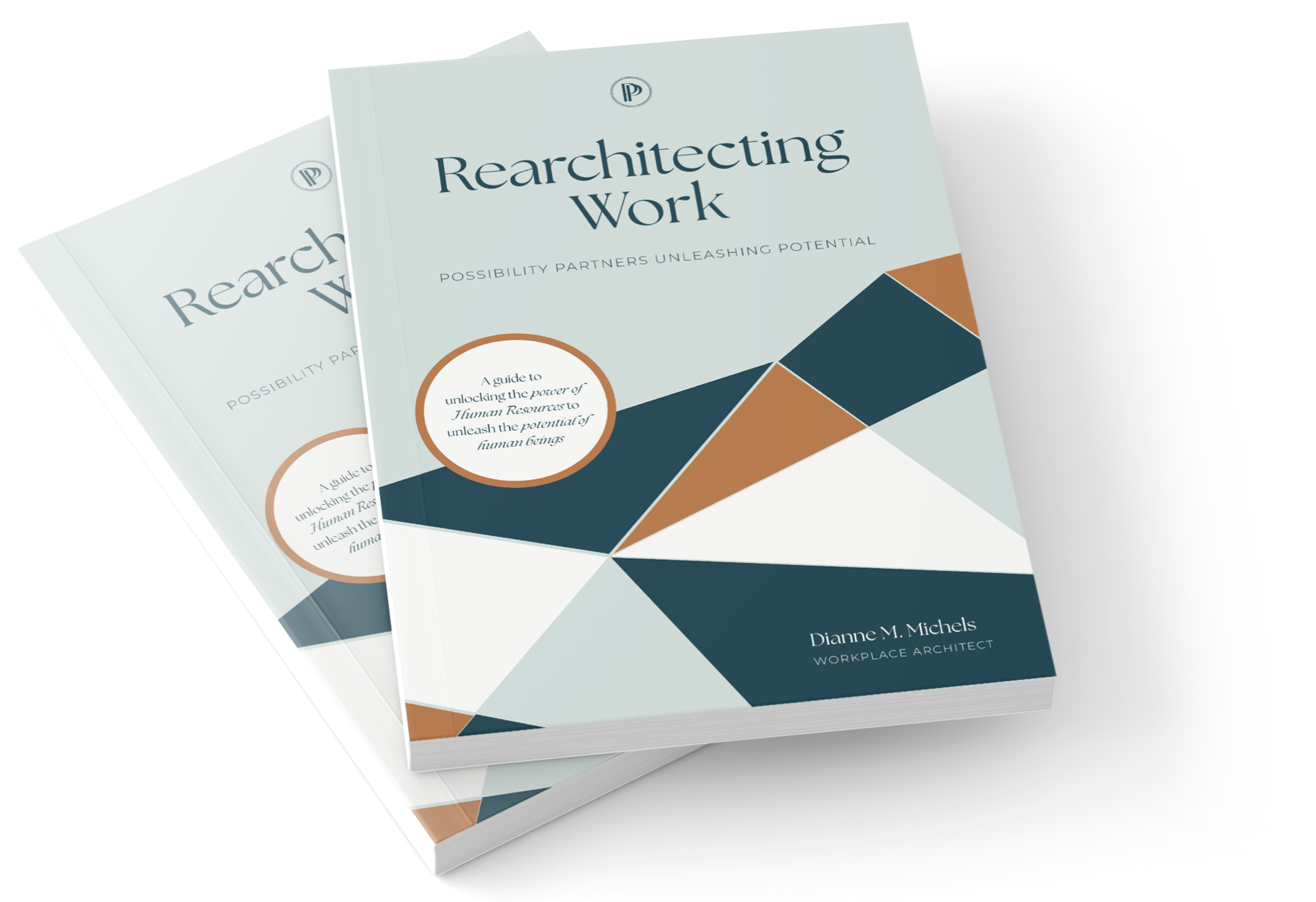12-WEEK COURSE
Rearchitecting Work
"POSSIBILITY PARTNERS UNLEASHING POTENTIAL"
12-WEEK COURSE
SIX, 60-MINUTE, BI-WEEKLY LEARNING MODULES
SIX, 45-MINUTE, BI-WEEKLY "CONVERSATIONS THAT MATTER"
Learn about the 10 design principles, the 7 tools, the paradigm shifts and leadership principles to unlock the power of Human Resources to unleash the potential of Human Beings . . . in workplaces where how results are achieved shifts from a focus on performance management to a focus on "Possibility Partners Unleashing Potential," resulting in enhancing ownership for results, psychological safety on teams, and "power with" relationships of mutual trust and respect between team leaders and team members.
Course starts: Tuesday, September 17, 2024
5:30 to 7:00 PM CST (Chicago time)
Course ends: Tuesday, November 26, 2024
Conversations start: Thursday, Sept.19, 2024
11:30 AM to 12:15 PM CST
Conversations end: Thursday, Nov. 28, 2024
SCHEDULE A CONVERSATION WITH DIANNE TO ENGAGE IN A DEEP DIVE TO DETERMINE IF THIS COURSE IS A FIT FOR YOU!
CLICK HERE TO SCHEDULE CALLWhat it is
Learning modules that provide an In-depth understanding of the 10 design principles and 7 practical tools; "Conversations that Matter" to support collaborative brainstorming for developing implementation plans customized to fit your unique workplace.


Who it is for
It’s for anyone at work who wants to gain insights and mastery into creating workplaces where our attitudes, values, beliefs, and behaviors about what’s possible at work change along with our relationships, and the tools for how we get work done.
The possibility exists for our change initiatives to produce not just changes in operating practices, but also greater ease and joy as we include more holistic, humanistic considerations in their development.
What is the potential that can be unleashed when bosses become mentors; delegation of responsibilities includes the decision-making authority needed to fulfill on those responsibilities; communications occur in psychologically safe environments where people are supported and encouraged to be honest and authentic, regardless of the hierarchical structures; trust levels among all workplace participants enhance autonomy for everyone, significantly reducing the need for micromanaging; job descriptions define concisely in one page the purpose, key responsibilities, key competencies, and key deliverables, leaving the “how” one fulfills on the responsibilities up to the person who’s been hired to do it; performance reviews consist of bi-weekly “How’s It Going” conversations to celebrate the ongoing successes and accomplishments, while solving any problems that may be getting in the way of future accomplishments; and instead of fixing what’s wrong, the focus is on creating what’s next, with all outcomes looked at as learning experiences vs. mistakes.
What you will learn:
10 Design Principles
You will gain in-depth knowledge about the 10 design principles and the 7 Tools for Collaboration, Employee Engagement, and Results Ownership:
- Stepping Up and Speaking Out
- Unlocking the Power of Human Resources to Unleash the Potential of Human Beings
- The Power of Possibility
- Leadership is a Mindset; Not a Position
- Inspiring Ownership for Results vs. Holding People Accountable
- Expressing Our Value vs. Proving Our Worth
- Participating, Contributing, Self-Expressing vs. Achieving, Acquiring, Winning
- Celebrating Diversity vs. Including Diversity
- Recruiting Raving Fans vs. Culture Fit
- Psychological Safety Communications vs. Being Right
7 Rearchitecting Work Tools For Collaboration, Engagement, Results Ownership
- Leadership Manifesto - a public declaration of organization-wide leadership values, beliefs, and intentions
- Team Role Descriptions (one page) to provide clear, concise, comprehensive, and compelling overview of each job to include Title, Purpose, Key Responsibilities, Key Competencies, Key Measurable and Consistently Reported Results
- Bi-Weekly, 7-point framework for “How’s It Going” Conversations to replace annual performance reviews
- Onboarding Conversation & Agreement for Team Role Expectations & Ownership for Results alignment
- Creating What’s Next Conversation to re-establish resources needed for ownership for results to replace Performance Improvement Plans (PIP’s)
- Conflict and Microaggression Resolution Process to expand individuals’ relationship building competencies vs. relying on Human Resources to resolve
- Raving Fans Talent Acquisition and Retention Framework
CLICK HERE TO SCHEDULE A CONVERSATION WITH DIANNE FOR A DEEP DIVE INTO WHETHER OR NOT THIS COURSE IS A FIT FOR YOU.
COURSE MATERIAL (Complimentary Copy included with Course Registration)
Rearchitecting
Work
"POSSIBILITY PARTNERS UNLEASHING POTENTIAL"
Identifies the 10 design principles that are the foundation for the 7 holistic tools developed to create the conditions for people to unleash their potential, purpose, power, and passion at work and in their lives.
Rearchitecting Work provides an overview of the new thinking Possibility Partners’ tools offer so that command and control bosses can become coaches and mentors, How’s It Going bi-weekly “power with” conversations can replace “power over” annual performance reviews, colleagues can interact as possibility partners in psychologically safe cultures, and “holding people accountable” is replaced with “inspiring ownership for results.”
“How can we begin to live from our imagination instead of our indoctrination?”
Glennon Doyle, author of Untamed

READY TO GET STARTED?
Enroll Today
Our core values
Trust & Respect
Trusting in ourselves, one another, and the universe is a fundamental requirement for optimizing our relationships and possibilities. Mutual respect unleashes an energetic connection that enhances our experiences of authenticity, confidence, collaboration, and creativity.
Clarity is Kindness
Defining job responsibilities and deliverables is a fundamental component for alignment on expectations among all team members.
“Power With” Relationships
Collaborative, equality-oriented relationships inspire confidence and competency-building vs. the feelings of fear and inadequacy that are often experienced in traditional command and control “power over” relationships.
Psychological Safety
Everyone is invited and encouraged to speak candidly with one another regardless of the hierarchical structure without fear of repercussions or diminished credibility.
Self-Expression
Work is experienced as an opportunity to express our value vs. prove our worth.
Contribution
Career/succession planning that encourages ownership for the difference we can make in the lives of others with the ongoing development of our unique talents and capabilities at work.

About Dianne Michels
As a Human Resources Futurist, Workplace Architect and Workplace Paradigm Shifter, with 30+ years of multi-faceted experiences in a diverse variety of enterprises, ranging from small, family-owned businesses, start-ups, political campaigns, and government agencies to international public relations firms and Fortune 500 companies, Dianne offers a pragmatic but innovative approach to guiding others to unleash their potential and experience the power of possibility, steeped in the strength of partnerships of mutual trust and respect, and the freedom and support for being seen and heard in relationships of psychological safety. Her breakthrough concepts and tools awaken others to the possibility of embracing work as a gift of participation, contribution, and self-expression vs. a burden to survive or a duty to perform, counting the days to retirement.
Dianne combines a passion for people unleashing their potential at work, with an in-depth understanding of Human Resources, organizational dynamics, operations infrastructures, and human behavior. She is thrilled and inspired by the possibility of partnering with organizations and individuals who share that passion and belief in the possibilities for creating the conditions and relationships at work that can unleash everyone’s potential.
Dianne’s purpose can best be defined as being committed to all people experiencing success at work, with success defined as, “Doing work you love, with people you love, for the reasons you love.”
She believes that possibility needs to be extended to all human beings, not just artists, musicians, actors, and a few lucky people! Dianne feels fortunate to have such a strong sense of purpose and enthusiastically invites everyone for whom this purpose resonates to join her in becoming Possibility Partners working together in the spirit of Goethe’s famous quote, “Whatever you can do, or dream you can, begin it. Boldness has genius, power and magic in it.”

Frequently Asked Questions
What’s the difference between focusing on managing performances vs. unleashing potential?
How can you possibly replace performance reviews with how’s it going conversations?
What do you mean when you talk about power over relationships vs. power with?
How can you hold people accountable if you don’t use performance improvement plans?
How is ownership for results different from holding people accountable?
How can we get honest answers in recruiting unless we put people on the spot with a rapid fire questioning manner?
How can I be an effective leader without people recognizing the power and status of my position?
How can performances be evaluated and developed without feedback from management?
Is promoting from within really a good idea?
How do you make sure everyone is onboard with the rearchitecting work infrastructures?
Get a FREE download of the BOOK SUMMARY OF Rearchitecting Work: POSSIBILITY PARTNERS UNLEASHING POTENTIAL that provides a preview of the 10 chapters and their underlying premises
Subscribe now to receive your copy.

